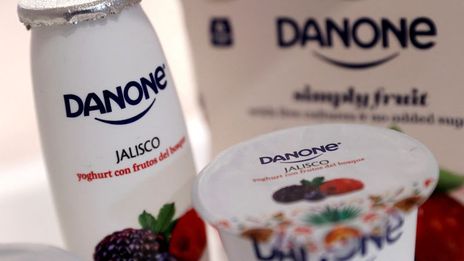HONG KONG/PARIS (Reuters) - France's Danone (>> DANONE) is aiming for a bigger slice of one of the world's fastest-growing dairy markets by investing 325 million euros ($417 million) in two deals with China Mengniu Dairy Co Ltd (>> China Mengniu Dairy Company Limited).
The world's biggest yoghurt maker, with brands such as Actimel and Activia, estimates the Chinese yoghurt market - currently worth 2 billion euros in annual sales - will more than double in the next five years.
On the hunt for growth beyond a stagnant Europe, Danone and its rivals, such as Nestle (>> Nestle SA) and Unilever (>> Unilever plc), have found it difficult to sell consumer goods in the world's second largest economy and most populous country, where the market is dominated by local firms.
Danone's previous attempts have misfired. Five years ago it walked away from a yoghurt joint venture with Mengniu, which is China's top milk producer. Soon after it suffered a bitter commercial dispute with soft drinks firm Hangzhou Wahaha Group.
Coming after a scandal in 2008 over melamine-laced milk in China, when six infants died and 300,000 fell ill, Danone's partnership with Mengniu is expected to ease concerns over quality because foreign brands are perceived as offering higher safety standards.
China is Danone's fourth-biggest market after Russia, France and the United States, and contributes 6 percent of its total revenue. Danone sells Activia yogurt under the brand Bio and Dumex infant formula in China.
It is the most exposed among big food groups to the euro zone crisis, intensifying pressure on the company to find new growth markets.
The deal involves the creation of a joint venture between Danone and state-owned Chinese food enterprise COFCO, Mengniu's biggest shareholder.
Danone will get a seat on Mengniu's board and a 4.1 percent holding, which it wants to increase to 10 percent. This may cost the French firm another 300 million euros, analysts say.
Danone will also set up a joint venture with Mengniu for the production and sale of yoghurt in China. Danone will own 20 percent of the business, which aims for a fifth of the market.
Analysts estimate the share capital deal cost Danone 180 million euros, while the yoghurt joint venture cost 145 million euros.
SENSIBLE VALUATION
Goldman Sachs estimates Danone paid an 11 percent premium to Mengniu's share price to acquire its stake. According to market research firm Euromonitor, China represented 8 percent of the global yoghurt market in 2011 and based on Goldman Sachs predictions, will contribute 21 percent of the market's growth to 2020.
Danone's deal was greeted with scepticism by investors following its previous missteps and shares were flat.
"The transaction will raise the spectre of Wahaha," brokerage Investec said in a note. But it added: "Danone gets a much bigger presence in China yoghurt, a high growth market, for a small investment and a sensible valuation."
The French group said it was reassured by the fact that Nordic rival Arla
The deals with Danone are seen as an attempt by Mengniu - twice hit by accusations that it sold tainted milk - to restore trust by joining forces with a leading international brand.
"Mengniu can, through a foreign partner, bring in new technology and technical know-how on the way to producing much safer dairy products to ease consumers' concerns over the quality of locally made products," said Andrew To, director of research at Hong Kong-based Emperor Capital Group.
Shares in Mengniu jumped as much as 11.4 percent to hit a 17-month high of HK$27.30, outpacing a 1.8 percent gain for the benchmark Hang Seng Index <.HSI>. The stock has risen eight times above its 2004 initial public offering price.
(Editing by Stephen Coates and Louise Heavens)
By Donny Kwok and Astrid Wendlandt


 By
By 









